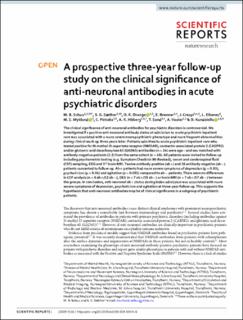| dc.contributor.author | Schou, Morten Brix | |
| dc.contributor.author | Sæther, Sverre Georg | |
| dc.contributor.author | Drange, Ole Kristian | |
| dc.contributor.author | Brenner, Eiliv | |
| dc.contributor.author | Crespi, Joan Vidal | |
| dc.contributor.author | Eikenes, Live | |
| dc.contributor.author | Mykland, Martin Syvertsen | |
| dc.contributor.author | Pintzka, Carl Wolfgang Schøyen | |
| dc.contributor.author | Håberg, Asta | |
| dc.contributor.author | Sand, Trond | |
| dc.contributor.author | Vaaler, Arne | |
| dc.contributor.author | Kondziella, Daniel | |
| dc.date.accessioned | 2021-11-17T08:56:12Z | |
| dc.date.available | 2021-11-17T08:56:12Z | |
| dc.date.created | 2020-01-03T22:20:48Z | |
| dc.date.issued | 2019 | |
| dc.identifier.issn | 2045-2322 | |
| dc.identifier.uri | https://hdl.handle.net/11250/2829998 | |
| dc.description.abstract | The clinical significance of anti-neuronal antibodies for psychiatric disorders is controversial. We investigated if a positive anti-neuronal antibody status at admission to acute psychiatric inpatient care was associated with a more severe neuropsychiatric phenotype and more frequent abnormalities during clinical work-up three years later. Patients admitted to acute psychiatric inpatient care who tested positive for N-methyl-D-aspartate receptor (NMDAR), contactin-associated protein 2 (CASPR2) and/or glutamic acid decarboxylase 65 (GAD65) antibodies (n = 24) were age – and sex matched with antibody-negative patients (1:2) from the same cohort (n = 48). All patients were invited to follow-up including psychometric testing (e.g. Symptom Checklist-90-Revised), serum and cerebrospinal fluid (CSF) sampling, EEG and 3 T brain MRI. Twelve antibody-positive (ab+) and 26 antibody-negative (ab−) patients consented to follow-up. Ab+ patients had more severe symptoms of depression (p = 0.03), psychoticism (p = 0.04) and agitation (p = 0.001) compared to ab− patients. There were no differences in CSF analysis (n = 6 ab+/12 ab−), EEG (n = 7 ab+/19 ab−) or brain MRI (n = 7 ab+/17 ab−) between the groups. In conclusion, anti-neuronal ab+ status during index admission was associated with more severe symptoms of depression, psychoticism and agitation at three-year follow-up. This supports the hypothesis that anti-neuronal antibodies may be of clinical significance in a subgroup of psychiatric patients. | |
| dc.language.iso | eng | |
| dc.rights.uri | https://creativecommons.org/licenses/by/4.0/ | |
| dc.title | A prospective three-year follow-up study on the clinical significance of anti-neuronal antibodies in acute psychiatric disorders | |
| dc.type | Peer reviewed | |
| dc.type | Journal article | |
| dc.description.version | publishedVersion | |
| dc.source.journal | Scientific Reports | |
| dc.identifier.doi | 10.1038/s41598-019-56934-6 | |
| dc.identifier.cristin | 1766179 | |
| cristin.unitcode | 1920,25,0,0 | |
| cristin.unitcode | 1920,22,0,0 | |
| cristin.unitcode | 194,65,35,0 | |
| cristin.unitcode | 194,65,30,0 | |
| cristin.unitcode | 194,65,25,0 | |
| cristin.unitcode | 1920,4,0,0 | |
| cristin.unitname | PH - Østmarka psykiatriske avdeling | |
| cristin.unitname | PH - Nidaros distriktspsykiatriske senter | |
| cristin.unitname | Institutt for psykisk helse | |
| cristin.unitname | Institutt for nevromedisin og bevegelsesvitenskap | |
| cristin.unitname | Institutt for sirkulasjon og bildediagnostikk | |
| cristin.unitname | Klinikk for bildediagnostikk | |
| cristin.ispublished | true | |
| cristin.fulltext | original | |
| cristin.qualitycode | 1 | |

